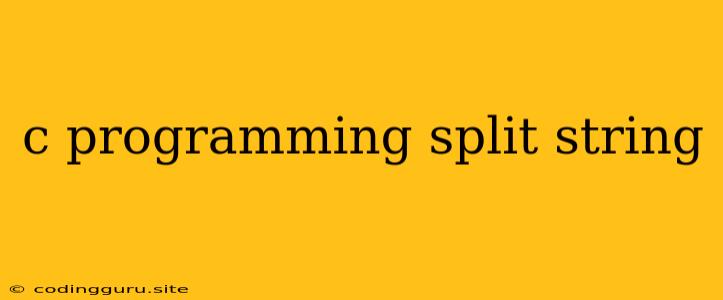Splitting Strings in C: A Guide to Parsing and Manipulating Text
In the realm of C programming, strings are fundamental data structures used to represent and manipulate textual data. Frequently, we encounter situations where we need to break down a string into smaller, meaningful components. This process, known as string splitting, involves dissecting a string based on specific delimiters, resulting in an array of individual substrings.
Why Split Strings?
Imagine you have a string containing a comma-separated list of names, such as "John,Jane,Peter". You might want to extract each name individually to process them separately. String splitting allows you to achieve this. It's an essential tool for tasks like:
- Parsing command-line arguments: When your C program receives input from the command line, you might need to split the input string into individual arguments.
- Processing data from files: When reading data from text files, the data is often separated by delimiters, such as commas, spaces, or tabs. Splitting strings helps you extract this data into meaningful units.
- Validating user input: Splitting user-supplied strings into individual components allows you to check for valid data formats and ensure data integrity.
Methods for Splitting Strings in C
C doesn't provide a built-in function specifically for splitting strings. However, you can leverage several techniques to achieve this:
1. Using strtok()
The strtok() function is a classic method for string splitting in C. It iteratively breaks down a string into tokens, which are substrings separated by delimiters. Here's how it works:
#include
#include
int main() {
char str[] = "This,is,a,test,string";
char delim[] = ",";
char *token;
token = strtok(str, delim);
while (token != NULL) {
printf("%s\n", token);
token = strtok(NULL, delim);
}
return 0;
}
This code will print the following output:
This
is
a
test
string
Key points about strtok():
- It modifies the original string, so make a copy if you need to preserve the original string.
- It's not thread-safe, so use with caution in multi-threaded applications.
2. Manual String Iteration
You can write your own string splitting function using a loop and character comparison. This approach gives you more control over the process.
#include
#include
void splitString(char *str, char *delim, char **tokens) {
int i = 0;
int tokenCount = 0;
char *tokenStart = str;
char *tokenEnd;
while (*str != '\0') {
if (*str == *delim) {
tokenEnd = str;
*tokenEnd = '\0';
tokens[tokenCount] = tokenStart;
tokenCount++;
tokenStart = str + 1;
}
str++;
}
if (tokenStart != str) {
tokens[tokenCount] = tokenStart;
tokenCount++;
}
}
int main() {
char str[] = "This,is,a,test,string";
char delim[] = ",";
char *tokens[10]; // Array to store the tokens
splitString(str, delim, tokens);
for (int i = 0; i < 5; i++) {
printf("%s\n", tokens[i]);
}
return 0;
}
This code will also print the same output as the strtok() example.
3. Using strstr()
The strstr() function finds the first occurrence of a substring within another string. You can use it iteratively to find delimiters and extract substrings.
#include
#include
int main() {
char str[] = "This,is,a,test,string";
char delim[] = ",";
char *token = str;
char *next = str;
int tokenCount = 0;
while ((next = strstr(token, delim)) != NULL) {
next[0] = '\0'; // Replace the delimiter with null terminator
printf("%s\n", token);
tokenCount++;
token = next + 1; // Move to the next token
}
printf("%s\n", token); // Print the last token
tokenCount++;
printf("Number of tokens: %d\n", tokenCount);
return 0;
}
This code will print the same output as the previous examples.
Choosing the Right Approach
The best method for string splitting depends on your specific needs:
strtok(): Simple and efficient for basic splitting.- Manual iteration: Provides flexibility and control, but can be more complex.
strstr(): Useful for finding specific substrings within a string.
Remember to consider the trade-offs between performance, memory usage, and complexity when choosing your approach.
Conclusion
String splitting is a fundamental technique in C programming. By effectively dissecting strings into smaller components, you can process text data, extract relevant information, and streamline your applications. Understanding the various methods available and choosing the most suitable approach will empower you to efficiently handle string manipulation tasks in your C programs.
